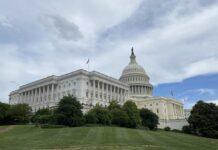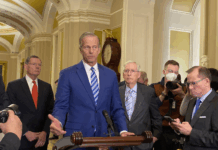
(GA Recorder) – Georgia lawmakers aim to create a new channel for political donations, and all they need now is Gov. Brian Kemp’s signature.
The House on Thursday passed a Senate bill along party lines that would allow party leaders to create new organizations to raise unlimited funds for races and allow candidates to bypass fundraising limitations.
The new groups are called leadership committees. They would be created by the state’s governor and lieutenant governor, the party nominees for those positions, and state House and Senate leadership for both parties.
Funneling donations through leadership committees will mean the public will know exactly who is donating to Georgia’s political parties and how their money is being spent,” Sen. Jeff Mullis, the bill’s author and chair of the powerful Senate Rules Committee, said from the Senate floor last month.
“There are all sorts of people who give money, like China, and I mean President Biden’s son’s friends, George Soros, absolutely, he gives millions or billions already, the Hollywood crowd, ACLU, Fair Fight, which is an oxymoron,” he said.
“Let’s do shine some light on some of these dark monies, and hopefully, this will be the beginning of eliminating all of them and bringing some transparency,” he added.
Under the legislation, leadership committees would be required to disclose any contribution or expenditure of $500 or more.
But the measure also expands the timeframe and amount of money lawmakers can raise.
State lawmakers have been banned for decades from raising money during the three-month legislative session – though caucus funds, which support the parties, can collect money during the session – to avoid the appearance of inappropriate lobbyist influence while lawmakers are voting, and individual donors can only spend a set amount on a candidate during each portion of the election cycle.
If Kemp signs the bill, those donors could give as much money as they like to the new leadership committees, including while the lawmakers are in session and voting on legislation that could benefit contributors.
Some lawmakers have raised concerns that lobbyists for a wealthy industry could ply lawmakers with contributions just as they prepare to vote on a measure that would affect their bottom line.
There are provisions within the bill to prevent that, said Majority Whip Trey Kelley, who sponsored the bill in the House.
“This bill is full of transparency and sunshine,” he said. “Once $500 is raised, then the funds will have to be disclosed in the same way our individual campaign committees are disclosed. Also, when funds are expanded on this measure, they have to have a disclaimer saying that they come from that leadership committee.”
However, a political nonprofit could take money without disclosing donors and then contribute to the proposed leadership committees.
House Democrats were not convinced by Kelley’s pitch Thursday, arguing that the bill will bring the potential for corruption.
“Money always finds a way into every nook and cranny that we allow it to, and it keeps us from putting the interests of our citizens first,” said Brookhaven Democrat Rep. Matthew Wilson. “There are no limits on the amount of money that donors can give to these committees. This bill would create even more incentives for special interests to donate unlimited funds during session – let me say that again, during legislative session. That gets us closer to that quid pro quo that our laws today acknowledge we need to be wary of.”
Atlanta Democrat Rep. Stacey Evans said the bill will make the parties more monolithic by forcing individual members to toe the party line if they want to continue receiving leadership committee funding.
“Do you really want to vote to give your caucus leadership, whoever they may be now and in the future, more power over your fate? To allow them to use unlimited campaign contributions and coordinate with your opponents if they think you’re getting out of line? Not only to do it but to threaten it, to hold that over your head in a way that they can’t right now?”
Kelley argued there is already dark money in Georgia politics, and this bill will help get it out, he said.
“This bill will take money that currently is being spent in dark money PACs, and it’ll bring sunshine on it,” he said. “It will make clear the donors that are coming from New York and California. What we’re looking for here, Mr. Speaker, is just an effort for transparency and the ability to coordinate for our caucuses.”
Kelley said the bill would not require either party to create leadership committees.
“If you don’t want to support it today, I hope that you will make the decision to be principled in your opposition and just not establish one because this isn’t mandatory,” he said. “This is selective, and so if you’re going to be critical today, I hope you’ll be as mindful when you have the opportunity to do that.”
Minority Whip David Wilkerson fired back with a political challenge of his own.
“I will gladly make that commitment to my friend, the fellow whip, if he returns that money to DC that they just sent us this week, the $1,400 plus all the child tax credits the Republicans all voted against,” Wilkerson said, referring to the American Rescue Plan.






